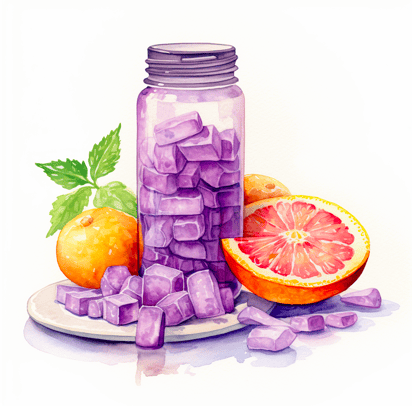
Have you ever wondered if your vitamin C supplements could be secretly sabotaging your quest for clear skin? Today, we’re diving into the pressing question: Can vitamin C supplements cause acne? While these supplements are a go-to for boosting overall health and radiance, there’s a twist—they aren’t actually the hero you think they are.
But don’t worry, there’s a better alternative!
Hi, I’m Hazel
I gave up on skincare after years of issues with acne and sensitive skin.
But after going plant-based, my skin cleared up and even started to glow. Now I help women reveal their natural beauty with simple, delicious plant-based food.
I also used to be a nurse, and love nerding out on nutritional science (high-quality science, that is).

As usual, this post is based on the strongest nutritional evidence I could find with a focus on the simplest, most delicious foods
…because who has time to waste on actions that don’t work?
The quick version:
High-dose vitamin C supplements might not be ideal for health and could be linked to acne.
Green tea is a safer alternative, providing vitamin c, acne-fighting ability and a range of other skincare benefits without the risks associated with supplements.
Supplements and Acne: What’s the Connection?
Unfortunately there isn’t any straight evidence that tells us if vitamin C supplements cause acne.
But here’s what we do know:
Not all supplements are gentle on your skin, and some, such as those containing vitamin B6 or vitamin B12, are known to cause a specific type of acnecalled monomorphic acne (1). This term refers to acne breakouts where the pimples look very similar to each other in size and shape, suggesting a direct trigger from the supplements.
Other supplements, like iodine from kelp and certain muscle-building supplements, can also aggravate your skin (1). These products might contain anabolic-androgenic steroids (AAS), which are known to cause severe acne. Iodine-related acne typically appears as small, uniform, inflamed bumps across the face and upper body.

Additionally, whey protein supplements, popular in bodybuilding, are linked to increased oil production and acne, especially on the body and occasionally the face (1).
Fortunately, stopping these supplements often leads to a clear improvement, indicating a direct link between the supplement and the skin issues.
Given these insights, if you’re aiming to maintain healthy skin and avoid acne flares, reducing your supplement intake could be beneficial. Emphasising a healthy diet rich in natural nutrients instead might offer your skin the benefits you seek. All without the risks associated with high-dose or problematic dietary supplements.
This approach not only simplifies your skincare routine but also supports overall skin health more effectively.
But Isn’t More Vitamin C Better?
It turns out, our bodies often get more vitamin C than they need from these high-dose supplements.

As a water-soluble vitamin, any excess just doesn’t stick around; it’s flushed out, leaving us to question the need for those hefty pills (2).
Think about it: the ideal intake of dietary vitamin C is about 200mg per day, easily covered by just a handful of fruits and veggies (about five serves per day) (2).
So, it’s a good idea to stop focusing on supplements, especially when aiming for vibrant skin health and effective collagen production. A single vitamin isn’t enough for complex skincare needs, and there are better uses of your time as we will find out below.
You Don’t Need Vitamin C Supplements for Colds
Navigating the cold season often leads us to reach for vitamin C supplements, hoping to dodge the sniffles.

But here’s a twist: while they might shorten colds, they don’t prevent them and, surprisingly, might contribute to acne flares (3).
How so? Well vitamin c supplements are also associated with increased infection (4).
If you’re taking vitamin C to keep your immune system up and acne down, consider integrating vitamin a, vitamin b, and vitamin einto your diet instead.
These nutrients support skin regeneration and maintain healthy skin without the pitfalls of high-dose supplements. Let’s keep your immune system strong and your skin clear with smarter, simpler choices.
Drinking Tea is Just as Easy
Did you know that a soothing cup of green tea might be more beneficial for your skincare and wellness routines than you think?

This humble beverage doesn’t just reduce acne, but also comes packed with numerous skin health benefits. It’s rich in antioxidants that combat free radicals, oxidative stress and provides sun protection against UV rays, crucial for maintaining youthful skin free of fine lines (5).
You might also like:
Matcha Magic: The Power of Green Tea for Acne-Free Skin
Research has shown that green tea can effectively manage blood sugar control, which directly influences acne-prone skin.
Stable blood sugar levels help to mitigate acne by reducing insulin spikes that can trigger inflammation and sebum production (6). Moreover, it’s anti-inflammatory properties help to manage skin conditions like acne more effectively (7).
Green tea also supports skin elasticity and may reduce the need for collagen supplements. While not protein-rich enough to boost production of collagen, it helps suppress collagen breakdown, preserving your skin’s firmness and wound healing of scar tissue (8, 9).
So why stick with popular supplements when a couple of cups of green tea each day can simplify your routine, improve your skin health, and enhance your immune system?
You may also like:
Glow Up or Break Out: Can Collagen Supplements Cause Acne?
Vitamin C Supplements vs. Green Tea
While the debate continues on whether vitamin C supplements directly cause acne, we can confidently assert the benefits of green tea for both skin health and immune support.
Green tea not only reduces acne but also offers additional advantages such as improved immune function.
Its broad spectrum of benefits makes it a superior choice for those looking to maintain health and tackle skin issues simultaneously. This certainty stands in contrast to the unclear effects of high-dose vitamin C on acne, positioning green tea as a robust, result-driven alternative in your health and skincare regimen.
You’ll love:
Sencha Green Tea: For Health and Beauty Inside and Out
Topical Vitamin C: Benefits and Limitations
When it comes to managing acne and enhancing skin health, topical vitamin C has gained popularity, particularly in the form of vitamin C serum. These serums are celebrated for their potential to act as effective acne treatments, reducing inflammation and promoting healing. Topical products applied directly to target areas of concern may allow for concentrated effects on problem spots.
However, while topical vitamin C can be beneficial, it’s important to note that it does not replace the holistic benefits of dietary vitamin C.
When vitamin C is consumed through diet, it contributes to overall skin health and immune function from the inside out, which can be more sustainable and healthful in the long term.
Moreover, while topical vitamin C is beneficial for reducing visible signs of acne and improving skin brightness, its effectiveness can vary based on the formulation and the individual’s skin type. In contrast, dietary vitamin C provides a consistent supply of antioxidants that support skin health comprehensively, making it a crucial component of a balanced diet and skin care regimen.
Can vitamin c supplements cause acne?
As we’ve explored whether vitamin C supplements can cause acne, it’s clear that the answer isn’t straightforward. While supplements offer a quick boost of this powerful antioxidant, they may not always be the best choice for everyone, especially those dealing with acne vulgaris. Instead, incorporating vitamin C naturally through citrus fruits and other dietary sources can provide more balanced benefits, helping to mitigate free radical damage and support overall skin health.
For those considering vitamin C for acne treatment, remember that how you take your vitamin C matters. Topical applications can directly target problem areas and are beneficial, yet integrating vitamin C into your diet ensures that your entire system reaps its antioxidant benefits, which is essential for achieving the best results. As always, consult with a skincare professional to tailor a treatment plan that addresses your specific needs and brings out the best in your skin.
References
Most references below will link to the original peer-reviewed study itself. However, sometimes I will link to a video over at NutritionFacts.org instead, which is by far the single best resource of brutally transparent nutritional evidence you will ever see. Dr Greger tells a great story about the realities of the science and if I think you will benefit more from one of his videos, the link will take you there instead.
Happy nerding!
- Zamil, D. H., Perez-Sanchez, A., & Katta, R. (2020). Acne related to dietary supplements. Dermatology Online Journal, 26(8). https://doi.org/10.5070/D3268049797
- Video: What Is the Optimal Vitamin C Intake? at NutritionFacts.org
- Hemilä H, Chalker E. Vitamin C for preventing and treating the common cold. Cochrane Database Syst Rev. 2013;2013(1):CD000980. Published 2013 Jan 31. doi:10.1002/14651858.CD000980.pub4
- Maserejian NN, Giovannucci EL, McVary KT, McKinlay JB. Dietary, but not supplemental, intakes of carotenoids and vitamin C are associated with decreased odds of lower urinary tract symptoms in men. J Nutr. 2011;141(2):267-273. doi:10.3945/jn.110.132514
- Heinrich U, Moore CE, De Spirt S, Tronnier H, Stahl W. Green tea polyphenols provide photoprotection, increase microcirculation, and modulate skin properties of women. J Nutr. 2011;141(6):1202-1208. doi:10.3945/jn.110.136465
- Villa-Rodriguez JA, Aydin E, Gauer JS, Pyner A, Williamson G, Kerimi A. Green and Chamomile Teas, but not Acarbose, Attenuate Glucose and Fructose Transport via Inhibition of GLUT2 and GLUT5. Mol Nutr Food Res. 2017;61(12):10.1002/mnfr.201700566. doi:10.1002/mnfr.201700566
- Eshghpour M, Mortazavi H, Mohammadzadeh Rezaei N, Nejat A. Effectiveness of green tea mouthwash in postoperative pain control following surgical removal of impacted third molars: double blind randomized clinical trial. Daru. 2013;21(1):59. Published 2013 Jul 18. doi:10.1186/2008-2231-21-59
- Prasanth MI, Sivamaruthi BS, Chaiyasut C, Tencomnao T. A Review of the Role of Green Tea (Camellia sinensis) in Antiphotoaging, Stress Resistance, Neuroprotection, and Autophagy. Nutrients. 2019;11(2):474. Published 2019 Feb 23. doi:10.3390/nu11020474
- Chiu AE, Chan JL, Kern DG, Kohler S, Rehmus WE, Kimball AB. Double-blinded, placebo-controlled trial of green tea extracts in the clinical and histologic appearance of photoaging skin. Dermatol Surg. 2005;31(7 Pt 2):855-860. doi:10.1111/j.1524-4725.2005.31731